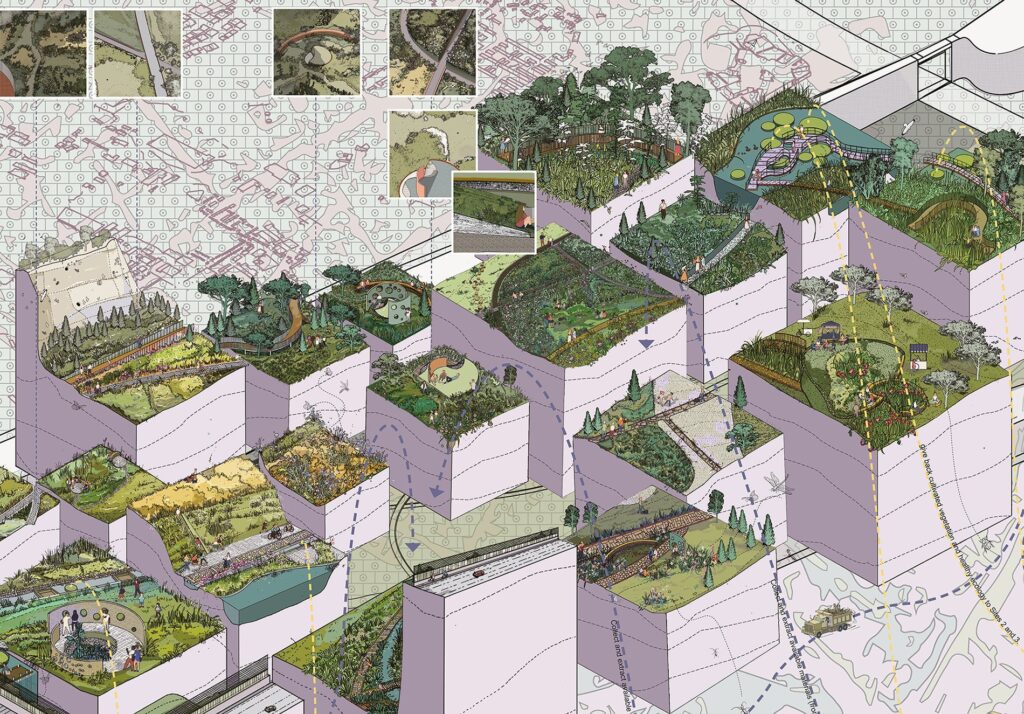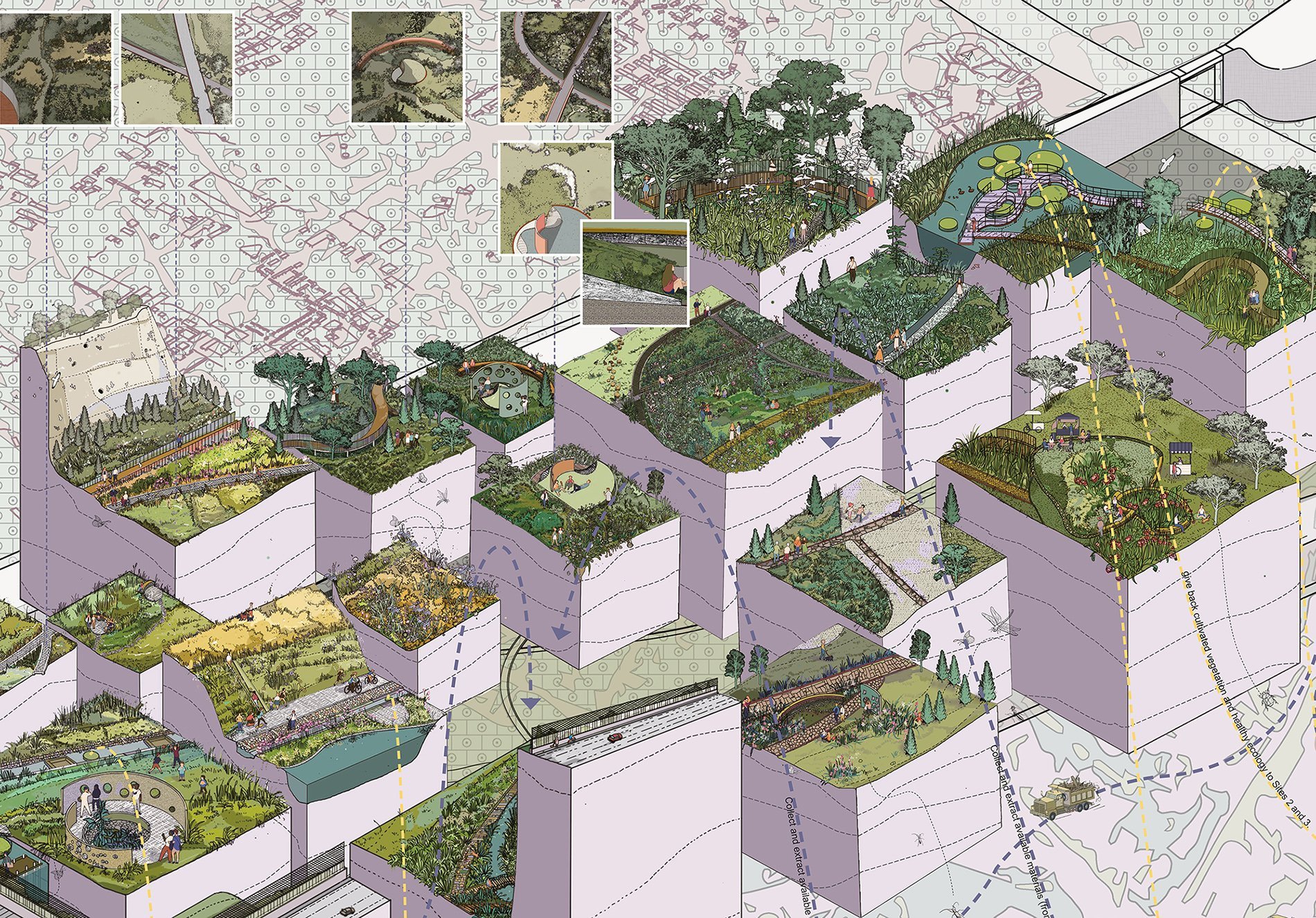
Mastering the Landscape: Exploring the MA in Landscape Architecture
The MA in Landscape Architecture is a postgraduate degree designed for individuals seeking to shape the environment through thoughtful design and sustainable practices. This advanced degree equips students with the knowledge and skills to create functional, aesthetically pleasing, and ecologically sound landscapes. Whether you’re a recent graduate or a seasoned professional looking to advance your career, an MA in Landscape Architecture can open doors to a wide range of opportunities in both the public and private sectors. This article delves into the intricacies of this degree, exploring its curriculum, career prospects, and the impact landscape architects have on the world around us.
What is Landscape Architecture?
Landscape architecture is more than just gardening; it’s a multidisciplinary field that combines art, science, and technology to plan, design, and manage outdoor spaces. Landscape architects work on a diverse range of projects, from urban parks and residential gardens to large-scale infrastructure projects and environmental restoration initiatives. They consider factors such as site analysis, environmental impact, social needs, and aesthetic principles to create sustainable and functional landscapes. The MA in Landscape Architecture prepares students to tackle these complex challenges.
Key Responsibilities of a Landscape Architect
- Conducting site analysis and assessments
- Developing design concepts and plans
- Creating detailed construction documents
- Selecting appropriate plant materials and hardscape elements
- Managing project budgets and timelines
- Collaborating with other professionals, such as architects, engineers, and planners
- Ensuring compliance with regulations and environmental standards
Why Pursue an MA in Landscape Architecture?
An MA in Landscape Architecture offers numerous benefits for those seeking a career in this dynamic field. Here are some key reasons to consider pursuing this advanced degree:
Enhanced Knowledge and Skills
The curriculum of an MA in Landscape Architecture program is designed to provide students with a comprehensive understanding of the principles and practices of landscape architecture. Students learn about design theory, site planning, plant ecology, construction techniques, and sustainable design principles. They also develop critical thinking, problem-solving, and communication skills, which are essential for success in the profession.
Career Advancement Opportunities
An MA in Landscape Architecture can significantly enhance career prospects. Graduates are qualified for a wider range of positions, including senior designer, project manager, and landscape architect. They may also be eligible for leadership roles in design firms, government agencies, and non-profit organizations. The degree also provides a strong foundation for starting your own landscape architecture practice.
Networking Opportunities
MA in Landscape Architecture programs provide students with valuable networking opportunities. Students have the chance to interact with faculty members, industry professionals, and fellow students from diverse backgrounds. These connections can lead to internships, job opportunities, and collaborations on future projects. Many programs also offer opportunities to participate in conferences, workshops, and design competitions, further expanding professional networks.
Contribution to a Sustainable Future
Landscape architects play a crucial role in creating a sustainable future. They design landscapes that conserve water, reduce energy consumption, and promote biodiversity. They also work to mitigate the effects of climate change by creating green infrastructure that absorbs stormwater, reduces urban heat island effect, and sequesters carbon. An MA in Landscape Architecture equips students with the knowledge and skills to address these critical environmental challenges.
What to Expect in an MA in Landscape Architecture Program
The curriculum of an MA in Landscape Architecture program typically includes a combination of studio courses, lecture courses, and research projects. Studio courses focus on design projects, allowing students to apply their knowledge and skills to real-world scenarios. Lecture courses cover topics such as landscape history, design theory, plant ecology, and construction techniques. Research projects allow students to explore specific areas of interest in landscape architecture.
Core Coursework
- Landscape Design Studio: Develop design skills through hands-on projects.
- Landscape History and Theory: Explore the evolution of landscape architecture and its theoretical underpinnings.
- Plant Ecology: Learn about plant communities and their role in the landscape.
- Site Planning: Understand the principles of site analysis and planning.
- Construction Techniques: Learn about the methods and materials used in landscape construction.
- Sustainable Design: Explore sustainable design principles and practices.
- GIS and CAD: Master the use of Geographic Information Systems and Computer-Aided Design software.
Thesis or Capstone Project
Most MA in Landscape Architecture programs require students to complete a thesis or capstone project. This is an opportunity for students to conduct independent research on a topic of their choice and to demonstrate their mastery of the principles and practices of landscape architecture. The thesis or capstone project can be a design project, a research paper, or a combination of both.
Career Paths with an MA in Landscape Architecture
An MA in Landscape Architecture opens doors to a wide range of career paths. Here are some common career options for graduates:
Landscape Architect
Landscape architects work in design firms, government agencies, and private practices. They design and manage outdoor spaces, from parks and gardens to urban plazas and infrastructure projects. They collaborate with other professionals, such as architects, engineers, and planners, to create sustainable and functional landscapes.
Urban Planner
Urban planners work to improve the quality of life in urban areas. They develop plans for land use, transportation, and infrastructure. They also work to address issues such as housing affordability, environmental sustainability, and social equity. An MA in Landscape Architecture provides a strong foundation for a career in urban planning, particularly in areas related to green infrastructure and open space planning.
Environmental Planner
Environmental planners work to protect the environment and natural resources. They develop plans for land management, water resources, and air quality. They also work to mitigate the impacts of development on the environment. An MA in Landscape Architecture provides a strong foundation for a career in environmental planning, particularly in areas related to ecological restoration and sustainable land management.
Landscape Designer
Landscape designers focus on the aesthetic and functional aspects of outdoor spaces. They work with clients to create custom designs for residential gardens, commercial properties, and public spaces. They select appropriate plant materials and hardscape elements to create visually appealing and functional landscapes. While a bachelor’s degree might suffice, an MA in Landscape Architecture provides a more advanced understanding of design principles and construction techniques, leading to more complex and rewarding projects.
Park Planner
Park planners work for government agencies and non-profit organizations to plan and manage parks and recreational areas. They develop plans for park design, development, and maintenance. They also work to ensure that parks are accessible to all members of the community. An MA in Landscape Architecture is highly valuable for park planning roles, providing expertise in site planning, design, and environmental sustainability.
Choosing the Right MA in Landscape Architecture Program
Selecting the right MA in Landscape Architecture program is a crucial step towards achieving your career goals. Here are some factors to consider when making your decision:
Accreditation
Ensure that the program is accredited by the Landscape Architectural Accreditation Board (LAAB). Accreditation ensures that the program meets certain standards of quality and prepares graduates for professional practice.
Faculty Expertise
Research the faculty members and their areas of expertise. Look for faculty who are actively engaged in research and practice in areas that align with your interests.
Program Curriculum
Review the program curriculum and ensure that it covers the topics that are most important to you. Look for programs that offer a balance of studio courses, lecture courses, and research opportunities.
Location and Resources
Consider the location of the program and the resources that are available to students. Look for programs that are located in vibrant urban areas or near natural landscapes that offer opportunities for fieldwork and research.
Cost and Financial Aid
Evaluate the cost of the program and explore available financial aid options. Look for programs that offer scholarships, fellowships, and assistantships.
The Future of Landscape Architecture
Landscape architecture is a rapidly evolving field that is constantly adapting to new challenges and opportunities. As the world becomes increasingly urbanized and faces the impacts of climate change, the role of landscape architects will become even more critical. Landscape architects will be at the forefront of creating sustainable and resilient landscapes that enhance the quality of life for all. An MA in Landscape Architecture will equip you with the skills and knowledge to be a leader in this exciting and important field. The demand for skilled professionals with an MA in Landscape Architecture continues to grow, reflecting the increasing recognition of the importance of well-designed and sustainable landscapes.
In conclusion, pursuing an MA in Landscape Architecture is a significant investment in your future. It provides you with the knowledge, skills, and network to make a meaningful contribution to the world around you. By carefully considering your options and choosing the right program, you can embark on a rewarding and fulfilling career in this dynamic and impactful field. Landscape architecture is a profession dedicated to creating beautiful, functional, and sustainable environments. The MA in Landscape Architecture is your gateway to shaping the future of our planet.
[See also: Sustainable Landscape Design Principles]
[See also: The Role of Landscape Architecture in Urban Planning]
[See also: Careers in Environmental Design]

